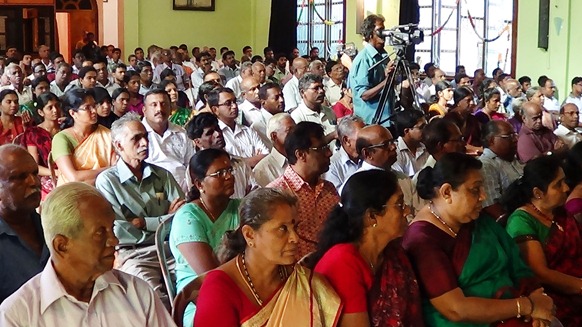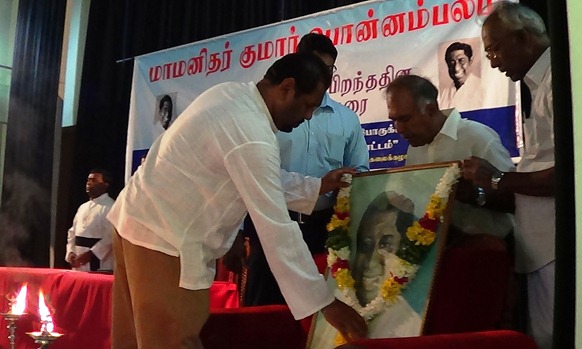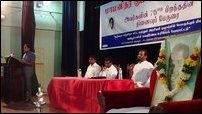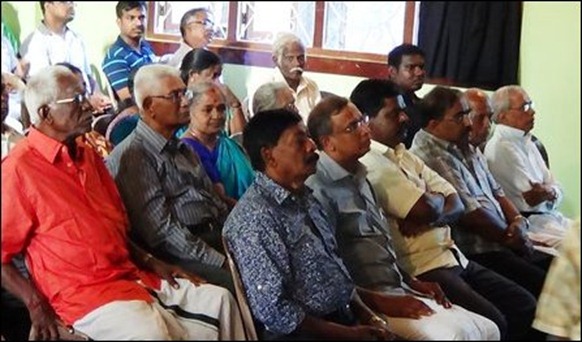Do we have an environment to talk about Tamil nation and its right to self-determination? Do we have to ask for internal self-determination? Should we go step-by-step in achieving the goals? Do we have the right to call for a referendum? Could we insist on a transitional administration? Are they all realistic in our situation: asking these questions at the Kumar Ponnambalam Memorial Lecture to a fully packed audience in Jaffna on Sunday, Jaffna University Law Lecturer Kumaravadivel Guruparan said that we cannot wage a struggle by seeing what is in the international law, as international law is purposefully ambiguous leaving space for further discourses, and as what needed more than the international law are the mass mobilisation and the backing of powerful friends.
 Hundreds of people, including university students, religious dignitaries, civil activists, political party members and parliamentarians attended a tightly packed house at the I’lang Kalaignar Man’ram Hall in Nalloor, Jaffna, on Sunday to observe the 75 birth anniversary of the late Maamanithar Kumar Ponnampalam.
Hundreds of people, including university students, religious dignitaries, civil activists, political party members and parliamentarians attended a tightly packed house at the I’lang Kalaignar Man’ram Hall in Nalloor, Jaffna, on Sunday to observe the 75 birth anniversary of the late Maamanithar Kumar Ponnampalam.
 Guruparan Kumaravadivel delivered the memorial lecture.
Guruparan Kumaravadivel delivered the memorial lecture.
TNA MPs Suresh Premachandran, MA Sumanthiran, S. Sritharan and former TNA parliamentarian Solomon Syril were among the audience.
* * *
 Guruparan in his address elucidated on why Tamils should not take the 13th Amendment even as a starting point, why the Tamils have to come out of compromise polity, why they should not be hesitant to the use of the terms such as nation and right to self-determination, why they should not be carried away by the step-by-step process, why they should seek investigations on war crimes, referendum and an interim administration and why they should concentrate on mass mobilisation.
Guruparan in his address elucidated on why Tamils should not take the 13th Amendment even as a starting point, why the Tamils have to come out of compromise polity, why they should not be hesitant to the use of the terms such as nation and right to self-determination, why they should not be carried away by the step-by-step process, why they should seek investigations on war crimes, referendum and an interim administration and why they should concentrate on mass mobilisation.
* * *
While talking on the need to mass mobilisation, Guruparan said that rather than conceiving a mobilisation against the international system, the mobilisation has to create a space for planning on our own for the future. Such a space has to lead us to the re-articulation on Tamil National polity.
On the foreign policies of the USA, China and India towards the Tamil question, he left the task of understanding them to the audience, without commenting anything.
Commenting on Guruparan’s address, Tamils for alternative politics in the island said that just like the incapacity of the Sri Lankan State elucidated by Guruparan, the three Establishments cited by him have also proved their incapability hitherto, with no signs of any edification.
All their efforts, hijacks, manipulations and engineering are now focussed towards simulating a ‘success’ to the Provincial Council process, and what they are doing will be shortly understood by the public, the activists said.
Further comments from the activists:
Tamils could never be against the world or against the real international community of peoples.
But the Establishments that have hijacked the name of the international community ask for trouble by making people all over the world to lose faith in the planet they live in.
Eezham Tamils are one of the worst examples, in which none of the Establishments gave any hope on justice in the planet.
Losing faith in the entire planet one lives in is worse than any genocide committed on humanity hitherto, as it is committed on people while they are alive. Such is the genocide that is being committed on Eezham Tamils today, by Washington, New Delhi, London and Beijing, more than the agent-State in Colombo.
Whether the mass mobilisation of global Tamils has to be in collaboration with other affected peoples all over the world amounting to 99 per cent, or it has to be for the purpose of ‘creating a space for planning for future on our own’ depends very much on the change of attitude and open demonstration of it by the international Establishments.
Unless such hopes come from them, mass mobilisation, at least for the mental existence of the affected people, cannot escape from being orientated against the international system dominated by the said Establishments that has caused and is causing misery to Tamils and against the elements within Tamils that are mobilised to serve the agenda of the Establishments.
In the name of seeking space for planning for future, implying against mass mobilisation targeting the international system responsible for the misery, should not be the preparation for the next genre of diffusers and compromisers, cautioned the activists for alternative politics in the island.
It is true that a mass struggle alone would not succeed without a wider ideological preparation and universal mobilisation of like-minded forces. But why the hesitation in naming the ultimate culprits and educating the masses for mobilisation against such universal injustice? Inability to organize or identify with grassroot forces in the island, in Tamil Nadu and in the diaspora should not be a mask for calling for essence-less mobilisations that are not going to convince the masses.

Guruparan’s address in Tamil, summarised in English by TamilNet:
PDF: [Tamil] Kumar Ponnampalam Memorial Lecture by Guruparan Kumaravadivel
Tamil parliamentary politics since the independence of Ceylon was a politics of compromise.
When Sinhala became the only official language, instead of fighting for equal rights, the then Tamil parliamentary leadership accepted ‘special rights’ for Tamil.
Politicians of federal polity compromised with the regional councils of Banda-Selva pact in 1957 and diluted it further by talking about district councils in 1965.
The polity that came out with the Vaddukkoaddai Resolution in 1976, calling for independence, was prepared to contest district councils in 1981.
It was only after Tamil militancy overtaking parliamentary politics there was no space for such double-dealings.
In order to weaken the legitimacy of the Tamil armed struggle internationally and among the Tamil people, the Chandrika government in 1994, tried through the appointment of a Tamil foreign minister and through entering into a deal with the TULF.
Kumar Ponnambalam was the only leader at that time, who had understood the agenda and has worked against the political dichotomy that was aiming to delink the political aims of the militant struggle from non-militant politics.
TNA was then an achievement in countering the agenda.
But after May 2009 the TNA gas gone back to pre 1980 polity. Those who have not agreed with the polity has come out and has founded the TNPF
* * *
The agenda of the outside forces is to deviate Tamil politics from Tamil nationalist polity.
The trend ultimately would make people to compromise with oppression.
We need a political discourse to come out of aspirational politics, symbolic struggle and token resistance. This has to come out from the grassroots to the top.
The discourse also needs to understand the international space.
Do we have an environment to talk about Tamil nation and its right to self-determination?
Do we have to ask for internal self-determination?
Should we go for step-by-step in achieving the goals?
Do we have the right to call for a referendum?
Could we insist on a transitional administration?
Are they all realistic in our situation?
* * *
The present Tamil leadership hesitates in using the terms nation and right to self-determination.
Whether the minority formula is appropriate?
International law implies that those who wage a struggle under a minority tag cannot claim for the right to self-determination.
Hence, once you go into ‘minority’ politics that would mean that you have dropped the claim for self-determination.
There are also suggestions that why shouldn’t we use the term people instead of nation.
There could be no debate on calling Tamils who have a historical homeland in the island as a people.
But the international law is silent on how to define ‘peoples’.
As the term people, is not well defined in international law, there need not be any hesitation in using the term nation.
* * *
We cannot wage a struggle by seeing what is in the international law.
International law is always ambiguous so that there will be space for discourses.
Therefore we have to define our own struggle and have to see where the international law could be of any use.
Use of terms such as nation and right to self-determination doesn’t mean talking about a separate country. There cannot be any qualms to the international community on the use of these terms.
Only a separate country is a hindrance to their geopolitics. That’s why the militant struggle was crushed. It is a wrong interpretation to say that the armed struggle was crushed because it didn’t respect human rights.
* * *
There are some who have started telling that the Tamils ask only for internal self- determination.
In international law there is only one right to self-determination.
There is no international document that recognises ‘internal’ right to self-determination.
There are doubts about its absorption in traditional national laws either.
A Canadian High court judgement says that if internal self-determination is consistently rejected to a people then they could claim external self-determination.
But there are doubts on its application to international law.
International law talks on upholding territorial integrity on one hand and talks about the right to self-determination on the other hand.
Where to identify the situations of exceptions that recognise right to self-determination [of a people] over territorial integrity [of a State]?
Ethnic orientated oppression is an accepted instance. But then, how to define ethnic oppression?
* * *
Remedial right to secession is one concept. But some say it is not an entitlement [for the affected people].
On Kosovo, it is said that it was not merely the principle Remedial Sovereignty [that conceded independence], but consistent refusal to accept institutional set ups brought in through international efforts [that caused the secession].
Even USA says that Kosovo is a case of special circumstances and not precedence for the application of the right to self-determination.
International law doesn’t help the creation of a separate country. What needed are the strength of arm and the backing of powerful friends.
International policy planners identify a connection between investigation on war crimes and the claims for Remedial Sovereignty.
* * *
Secondly, by accepting the hollow 13th Amendment as a starting point, the avenue to find a meaningful solution will be blocked.
It is dangerous to say that the PC model is a staring point for asserting to internal self-determination. It will mean that the party calling for internal self-determination has found an institutional way for that.
It is only the concerned people who have the right to say what kind of self-determination they want. It is not righteous to say that they have the right only for internal self-determination but not for external.
There is a pre constitutional stage. The Sinhala State should agree for a new social contract among the concerned peoples.
Nothing is going to be achieved without parity of status in a [ethnically] hierarchical State.
Even in an example related to Northern Ireland, the solution was reached only after UK saying that it would not oppose the people of Northern Ireland in future deciding for secession through a referendum. It was done through an international treaty and through its induction in the constitution.
Thus UK had accepted the right to self-determination of the people of Northern Ireland.
That’s why I say the step-by-step process would not work
* * *
Referendum has been used in several contexts: in the creation of new countries, in bringing in new constitutions, in the creation of models for sub-states, and in the creation of supranational models such as the EU.
Scotland plans a referendum on secession in 2014,
In Montenegro the diaspora was permitted to vote.
The Sudan referendum was the result of an international peace initiative.
China and Japan silently contributed to South Sudan. The very next day of its declaration India recognized the new country.
I leave it to you for judging what foreign policy the USA, China and India have on Tamils.
Call for referendum cannot be ethically rejected.
We have to put forward it as a process-related articulation.
* * *
If any argue that the 13th Amendment would bring in interim relief to the sufferings of Tamils, they have not read the provisions of the Amendment.
That’s why we have to demand a transitional administration.
UN has implemented such arrangements in the other contexts. They were created outside of the constitution of those countries. The process paved way for supervised independence. It may be argued that it was a process for neo-colonialism. But such criticism is only a luxury for the affected people.
As far as the North and East in the island are concerned, what actually takes place are military rule, occupied rule and the rule of a failed state.
This is not merely due to deficiency in democracy. As far as Tamils are concerned it is the question of very acceptance of that State.
From the fate befallen to the LLRC recommendations it should be clear that solutions could not be reached through the limits of State and constitution in the island.
* * *
Some argue whether Tamil National polity is practical.
Political reality has no limits. There is no such thing called minimum position.
Those who know very well that the minimum position is no solution to the issues put on a mask in the name of reality politics.
Therefore those who talk practicality are actually people who are weak in justifying the political stand they have taken. They are also dragging the people along with them into the vortex of oppression.
Realities have to be understood. They should not dictate our polity.
The functioning of international law depends on the course of international politics and understanding that will help avoiding disappointments.
In pushing forward the struggle of Tamils, there should be clarity on the internal–external talk on self-determination.
Rather than serving the interests of the outside forces what has to put forwarded are the interests of Tamils.
We need a foreign policy based on the national interest of Tamils. Such a policy need not consider any country as an enemy country.
Diplomatic moves alone are not going to help. For the success of the diplomatic moves in the international arena there should be the mass mobilisation.
Rather than conceiving a mobilisation against the international system the mobilisation has to create space for planning the future on our own. Such a space has to lead us to the re-articulation on Tamil National polity.
We can’t continue with pessimism and defeatism.
We have to openly denounce the snob that Tamils don’t have own thinking and are directed by outsiders. We need not answer to empty talks that the younger generation doesn’t know the realities and it has just been prompted to get infuriated.
Those who think of creating new structures at a difficult time are the true social activists. Shedding defeatism and entering into the field with determination for the dawn of the nation is the gratitude we could show to the sacrifices made by people like Kumar Ponnambalam, Guruparan concluded.
(For updates you can share with your friends, follow TNN on Facebook and Twitter )
